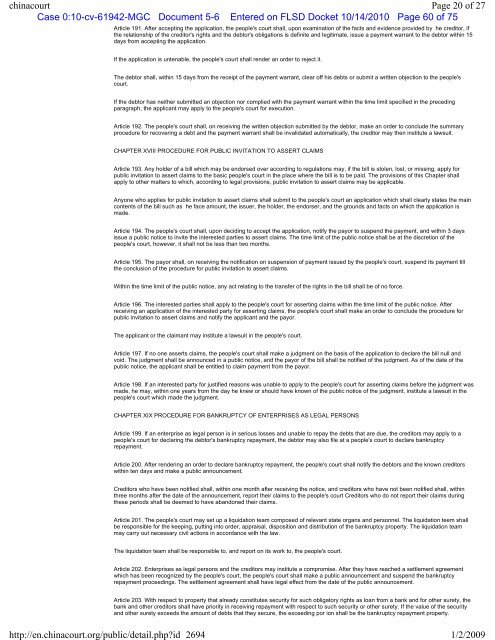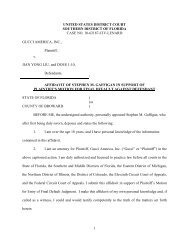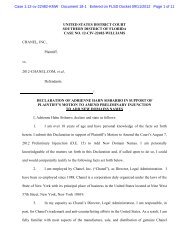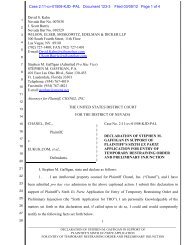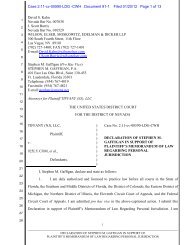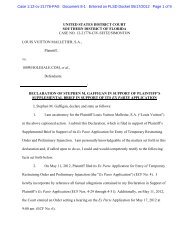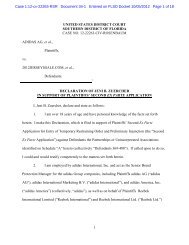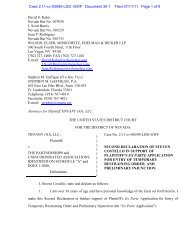UNITED STATES DISTRICT COURT SOUTHERN DISTRICT OF ...
UNITED STATES DISTRICT COURT SOUTHERN DISTRICT OF ...
UNITED STATES DISTRICT COURT SOUTHERN DISTRICT OF ...
You also want an ePaper? Increase the reach of your titles
YUMPU automatically turns print PDFs into web optimized ePapers that Google loves.
Case 0:10-cv-61942-MGC Document 5-6 Entered on FLSD Docket 10/14/2010 Page 60 of 75<br />
<br />
Article 191. After accepting the application, the people's court shall, upon examination of the facts and evidence provided by he creditor, if<br />
the relationship of the creditor's rights and the debtor's obligations is definite and legitimate, issue a payment warrant to the debtor within 15<br />
days from accepting the application.<br />
If the application is untenable, the people's court shall render an order to reject it.<br />
The debtor shall, within 15 days from the receipt of the payment warrant, clear off his debts or submit a written objection to the people's<br />
court.<br />
If the debtor has neither submitted an objection nor complied with the payment warrant within the time limit specified in the preceding<br />
paragraph, the applicant may apply to the people's court for execution.<br />
Article 192. The people's court shall, on receiving the written objection submitted by the debtor, make an order to conclude the summary<br />
procedure for recovering a debt and the payment warrant shall be invalidated automatically, the creditor may then institute a lawsuit.<br />
CHAPTER XVIII PROCEDURE FOR PUBLIC INVITATION TO ASSERT CLAIMS<br />
Article 193. Any holder of a bill which may be endorsed over according to regulations may, if the bill is stolen, lost, or missing, apply for<br />
public invitation to assert claims to the basic people's court in the place where the bill is to be paid. The provisions of this Chapter shall<br />
apply to other matters to which, according to legal provisions, public invitation to assert claims may be applicable.<br />
Anyone who applies for public invitation to assert claims shall submit to the people's court an application which shall clearly states the main<br />
contents of the bill such as he face amount, the issuer, the holder, the endorser, and the grounds and facts on which the application is<br />
made.<br />
Article 194. The people's court shall, upon deciding to accept the application, notify the payor to suspend the payment, and within 3 days<br />
issue a public notice to invite the interested parties to assert claims. The time limit of the public notice shall be at the discretion of the<br />
people's court, however, it shall not be less than two months.<br />
Article 195. The payor shall, on receiving the notification on suspension of payment issued by the people's court, suspend its payment till<br />
the conclusion of the procedure for public invitation to assert claims.<br />
Within the time limit of the public notice, any act relating to the transfer of the rights in the bill shall be of no force.<br />
Article 196. The interested parties shall apply to the people's court for asserting claims within the time limit of the public notice. After<br />
receiving an application of the interested party for asserting claims, the people's court shall make an order to conclude the procedure for<br />
public invitation to assert claims and notify the applicant and the payor.<br />
The applicant or the claimant may institute a lawsuit in the people's court.<br />
Article 197. If no one asserts claims, the people's court shall make a judgment on the basis of the application to declare the bill null and<br />
void. The judgment shall be announced in a public notice, and the payor of the bill shall be notified of the judgment. As of the date of the<br />
public notice, the applicant shall be entitled to claim payment from the payor.<br />
Article 198. If an interested party for justified reasons was unable to apply to the people's court for asserting claims before the judgment was<br />
made, he may, within one years from the day he knew or should have known of the public notice of the judgment, institute a lawsuit in the<br />
people's court which made the judgment.<br />
CHAPTER XIX PROCEDURE FOR BANKRUPTCY <strong>OF</strong> ENTERPRISES AS LEGAL PERSONS<br />
Article 199. If an enterprise as legal person is in serious losses and unable to repay the debts that are due, the creditors may apply to a<br />
people's court for declaring the debtor's bankruptcy repayment, the debtor may also file at a people's court to declare bankruptcy<br />
repayment.<br />
Article 200. After rendering an order to declare bankruptcy repayment, the people's court shall notify the debtors and the known creditors<br />
within ten days and make a public announcement.<br />
Creditors who have been notified shall, within one month after receiving the notice, and creditors who have not been notified shall, within<br />
three months after the date of the announcement, report their claims to the people's court Creditors who do not report their claims during<br />
these periods shall be deemed to have abandoned their claims.<br />
Article 201. The people's court may set up a liquidation team composed of relevant state organs and personnel. The liquidation teem shall<br />
be responsible for the keeping, putting into order, appraisal, disposition and distribution of the bankruptcy property. The liquidation team<br />
may carry out necessary civil actions in accordance with the law.<br />
The liquidation team shall be responsible to, and report on its work to, the people's court.<br />
Article 202. Enterprises as legal persons and the creditors may institute a compromise. After they have reached a settlement agreement<br />
which has been recognized by the people's court, the people's court shall make a public announcement and suspend the bankruptcy<br />
repayment proceedings. The settlement agreement shall have legal effect from the date of the public announcement.<br />
Article 203. With respect to property that already constitutes security for such obligatory rights as loan from a bank and for other surety, the<br />
bank and other creditors shall have priority in receiving repayment with respect to such security or other surety. If the value of the security<br />
and other surety exceeds the amount of debts that they secure, the exceeding por ion shall be the bankruptcy repayment property.


